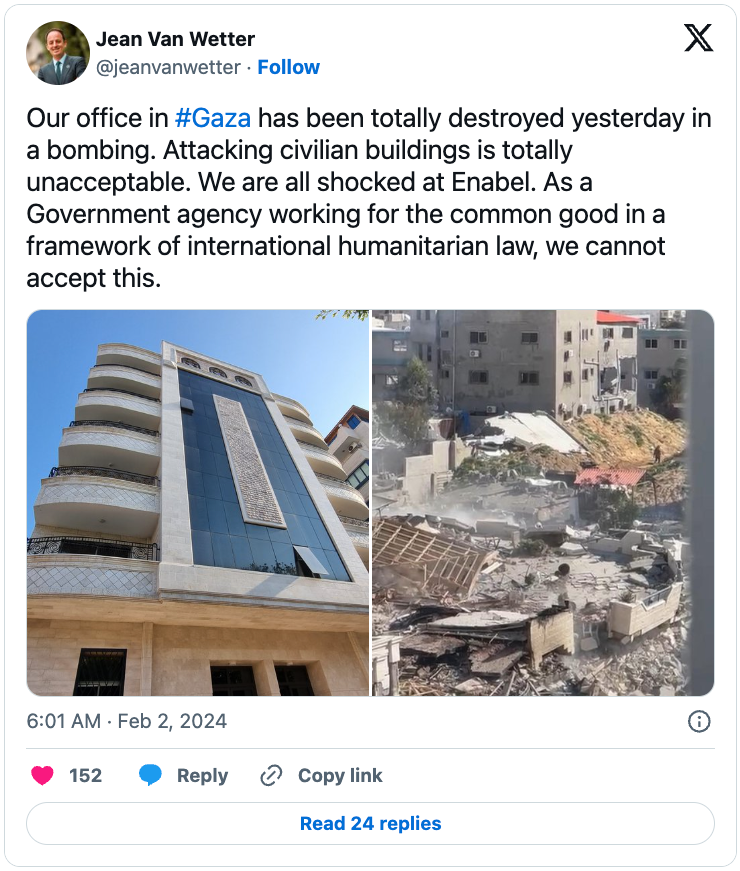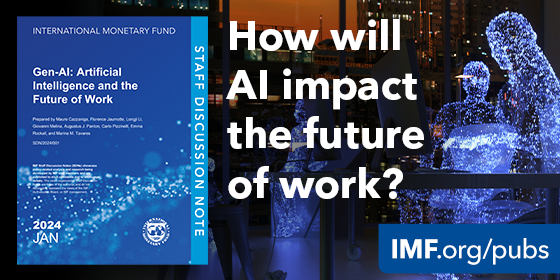|
Without monitoring, where’s the food systems transformation?
|
|
|
|
The Belgian government says it will summon Israel’s ambassador to the country after a building in Gaza that housed its development agency, Enabel, and another NGO was completely destroyed.
Also in today’s edition: We explain the first food system transformation monitor, and Jutta Urpilainen heads back to the European Commission. 
|
|
In the crossfire
The Belgian development agency is now another casualty of the war in Gaza. And its government is not happy.
“Targeting civilian buildings is unacceptable,” Belgian Foreign Minister Hadja Lahbib tweeted, adding that she and Belgian Development Minister Caroline Gennez will summon the Israeli ambassador to shed light on the situation. Though the exact circumstances regarding the attack remain unknown, Enabel CEO Jean Van Wetter tells my colleague Vince Chadwick that thankfully no staff member was in the rented office, which was completely leveled on Wednesday. |
|
Prior to the current fighting, Enabel had 22 staff members in Gaza working on projects concerning health, mental health and livelihood support, Van Wetter says, including the development of small and medium-sized enterprises and job creation via vocational training but the agency stopped its operations after Hamas’ Oct. 7 attack on Israel. Three dual nationals have already been evacuated and the 19 others were in the process of being evacuated.
In a statement to Devex, Humanity & Inclusion, an NGO that had its office in the same building as Enabel, writes that it is “devastated to share that our main office in the Gaza Strip has been destroyed in a bombing.” “Right now, our organization’s top priority is ensuring the safety and well-being of our staff and volunteers in Gaza. As far as we know, there were no HI staff present when the building was destroyed. We are still gathering information,” the statement reads. “There is no reason why a building for humanitarian staff should be destroyed,” Jeff Meer, U.S. executive director for Humanity & Inclusion, says in the statement. “Humanitarian aid agencies, workers and volunteers are part of the vital structure keeping Palestinians alive.” Read: NGO and Belgian development agency offices destroyed in Gaza |
|
|
|
A message from International Monetary Fund
AI reshaping labor markets and impacting incomes
Artificial intelligence will reshape labor markets, affecting 40% of global employment. While it threatens to replace some jobs, it will complement others. Surges in aggregate productivity could boost total incomes, but inequality may also increase. To fully harness AI’s potential, regulatory upgrades and digital infrastructure and skills will be essential. Read more today! |
|
|
|
First food monitor
Food systems transformation; it’s one of those terms that gets bandied about without people fully understanding it. But in short, if possible, it’s a comprehensive revamp of the entire food production and distribution process that addresses food insecurity, malnutrition, and environmental degradation.
That doesn’t sound too complex. So, throw in inclusivity and equity in benefits distribution, a circular economy to minimize waste, technology and innovation for efficiency, and supportive policies and governance structures. All this, of course, while aligning with the broader sustainability goals, especially zero hunger and responsible consumption and production. Not an easy feat, and how on earth can progress be monitored and assessed? In a first-of-its-kind effort, a group of experts has come up with a science-based architecture to assess food systems transformation worldwide. The idea came at the first United Nations Food Systems Summit in 2021, writes Rebecca Holland for Devex. “If we don’t measure transformation then we don’t know if we are achieving transformation. It is as simple as that,” says Lawrence Haddad of the Global Alliance for Improved Nutrition. The monitoring framework was built around five broad themes: Diets, nutrition, and health; environment, natural resources, and production; livelihoods, poverty, and equity; governance; and resilience. Read: Researchers unveil a way to monitor transformation of food systems |
|
Back to Brussels
The European Union will get its commissioner for development policy back after Jutta Urpilainen scored just 4.3% of the vote in her tilt for president of Finland earlier this week.
Urpilainen was on leave from the European Commission in Brussels during her campaign but never broke through in the polls — nor as it happened — on the night. A runoff will take place on Feb. 11 between former Finnish Prime Minister Alexander Stubb and Pekka Haavisto of the Green League. Urpilainen meanwhile took the result in her stride, gamely retweeting a satirical Brussels account that was making fun of her low score. “It was worth the effort,” she writes. “Happy to resume my role as a Commissioner, the work continues. See you in Brussels!” The Finn has her work cut out for her, with heads of government from the 27 European Union member states discussing whether to raid the bloc’s collective development budget to the tune of €2 billion ($2.16 billion) to bolster migration spending. |
|
|
|
Sponsored by People that Deliver
Opinion: Why we need to professionalize the health supply chain workforce
The supply chain management skills gap is one of the reasons why more than half of the African population lacks access to essential medicines. A professional supply chain workforce is key to remedy this and achieve universal health coverage. |
|
|
|
Audit day
Speaking of the EU, the bloc’s diplomatic service, known as the European External Action Service, is the subject of a new report out this week from the European Court of Auditors.
With 145 delegations worldwide, EEAS plays a critical role in Europe’s relations with other countries, particularly on development cooperation, Vince tells me. The service is mostly working effectively, the auditors find, but there were a few nuggets in the report:
|
|
Reaching local
In an effort to further localize operations, U.S.-based nonprofit VillageReach opened its Africa Regional Hub in Nairobi, Kenya, this week. The organization, which builds capacity for health systems in low-income countries, wants to take advantage of the city’s strategic position on the continent, bring operations closer, and solidify links with regional partners.
More than 70% of its global staff are based across Africa. In Nairobi, it has 14 staffers, but they hope to hire four additional people for the office, a spokesperson tells my colleague Sara Jerving. VillageReach is also working with the Kenyan government to “explore opportunities for the expansion of more programs.” Projects in Kenya include transporting polio samples from community health centers to laboratories, supporting a health hotline, and ensuring community health workers have access to health products. |
|
|
|
special notice
Climate change delivers disease to Nepal’s mountain communities
In the sweeping valleys of the Himalayan mountains, villagers are falling sick. Climate change is to blame. |
|
|
|
In other news
New cancer cases will reach 35 million in 2050, a 77% jump from the figure in 2022, according to a prediction by the World Health Organization’s cancer agency. [Al Jazeera]
More than 100 Myanmar migrants fled a detention center in Malaysia, resulting in one death, highlighting the country’s crackdown on undocumented migrants with thousands held in crowded centers. [Reuters] Two Russian courts issued the first convictions related to the government’s designation of the “international LGBT social movement” as extremist last year. [The Guardian] 
|
|
Thank you for reading today’s Newswire, edited by Rumbi Chakamba, copy edited by Florence Williams, and produced by Patricia Guerrero. Have a news tip? Email [email protected].
Forwarded by a friend?
Sign up here to receive the Newswire directly.
|
|
Devex thanks our partners for supporting our newsletters.
Our editorial content remains independent. Interested in partnering with us? Get in touch. |
|
Connect with us:
|







